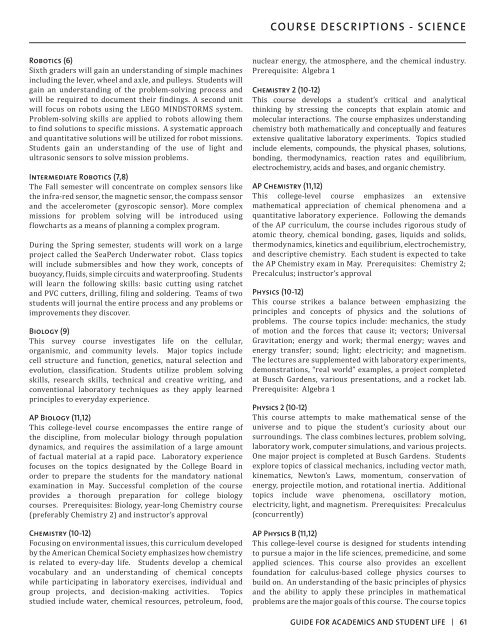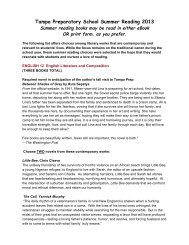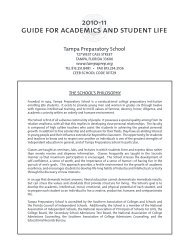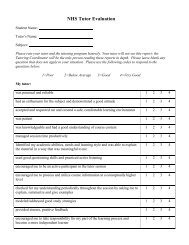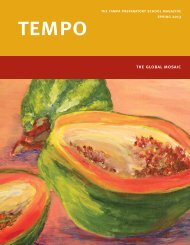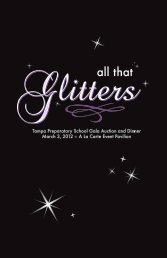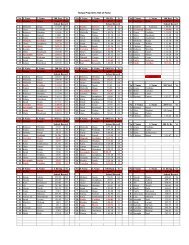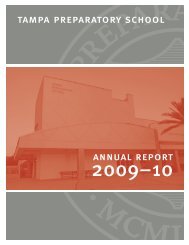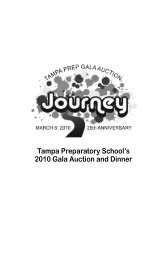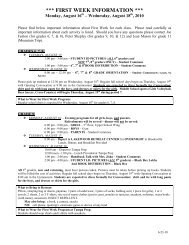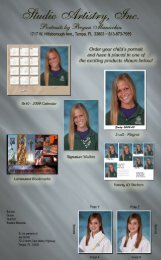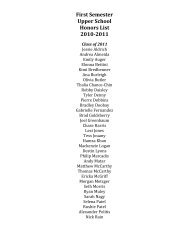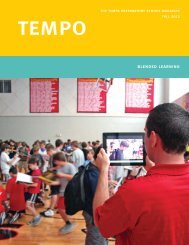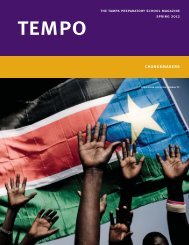2013-14 Guide for Academics and Student Life - Tampa Preparatory ...
2013-14 Guide for Academics and Student Life - Tampa Preparatory ...
2013-14 Guide for Academics and Student Life - Tampa Preparatory ...
- No tags were found...
Create successful ePaper yourself
Turn your PDF publications into a flip-book with our unique Google optimized e-Paper software.
COURSE DESCRIPTIONS - SCIENCERobotics (6)Sixth graders will gain an underst<strong>and</strong>ing of simple machinesincluding the lever, wheel <strong>and</strong> axle, <strong>and</strong> pulleys. <strong>Student</strong>s willgain an underst<strong>and</strong>ing of the problem-solving process <strong>and</strong>will be required to document their findings. A second unitwill focus on robots using the LEGO MINDSTORMS system.Problem-solving skills are applied to robots allowing themto find solutions to specific missions. A systematic approach<strong>and</strong> quantitative solutions will be utilized <strong>for</strong> robot missions.<strong>Student</strong>s gain an underst<strong>and</strong>ing of the use of light <strong>and</strong>ultrasonic sensors to solve mission problems.Intermediate Robotics (7,8)The Fall semester will concentrate on complex sensors likethe infra-red sensor, the magnetic sensor, the compass sensor<strong>and</strong> the accelerometer (gyroscopic sensor). More complexmissions <strong>for</strong> problem solving will be introduced usingflowcharts as a means of planning a complex program.During the Spring semester, students will work on a largeproject called the SeaPerch Underwater robot. Class topicswill include submersibles <strong>and</strong> how they work, concepts ofbuoyancy, fluids, simple circuits <strong>and</strong> waterproofing. <strong>Student</strong>swill learn the following skills: basic cutting using ratchet<strong>and</strong> PVC cutters, drilling, filing <strong>and</strong> soldering. Teams of twostudents will journal the entire process <strong>and</strong> any problems orimprovements they discover.Biology (9)This survey course investigates life on the cellular,organismic, <strong>and</strong> community levels. Major topics includecell structure <strong>and</strong> function, genetics, natural selection <strong>and</strong>evolution, classification. <strong>Student</strong>s utilize problem solvingskills, research skills, technical <strong>and</strong> creative writing, <strong>and</strong>conventional laboratory techniques as they apply learnedprinciples to everyday experience.AP Biology (11,12)This college-level course encompasses the entire range ofthe discipline, from molecular biology through populationdynamics, <strong>and</strong> requires the assimilation of a large amountof factual material at a rapid pace. Laboratory experiencefocuses on the topics designated by the College Board inorder to prepare the students <strong>for</strong> the m<strong>and</strong>atory nationalexamination in May. Successful completion of the courseprovides a thorough preparation <strong>for</strong> college biologycourses. Prerequisites: Biology, year-long Chemistry course(preferably Chemistry 2) <strong>and</strong> instructor’s approvalChemistry (10-12)Focusing on environmental issues, this curriculum developedby the American Chemical Society emphasizes how chemistryis related to every-day life. <strong>Student</strong>s develop a chemicalvocabulary <strong>and</strong> an underst<strong>and</strong>ing of chemical conceptswhile participating in laboratory exercises, individual <strong>and</strong>group projects, <strong>and</strong> decision-making activities. Topicsstudied include water, chemical resources, petroleum, food,nuclear energy, the atmosphere, <strong>and</strong> the chemical industry.Prerequisite: Algebra 1Chemistry 2 (10-12)This course develops a student’s critical <strong>and</strong> analyticalthinking by stressing the concepts that explain atomic <strong>and</strong>molecular interactions. The course emphasizes underst<strong>and</strong>ingchemistry both mathematically <strong>and</strong> conceptually <strong>and</strong> featuresextensive qualitative laboratory experiments. Topics studiedinclude elements, compounds, the physical phases, solutions,bonding, thermodynamics, reaction rates <strong>and</strong> equilibrium,electrochemistry, acids <strong>and</strong> bases, <strong>and</strong> organic chemistry.AP Chemistry (11,12)This college-level course emphasizes an extensivemathematical appreciation of chemical phenomena <strong>and</strong> aquantitative laboratory experience. Following the dem<strong>and</strong>sof the AP curriculum, the course includes rigorous study ofatomic theory, chemical bonding, gases, liquids <strong>and</strong> solids,thermodynamics, kinetics <strong>and</strong> equilibrium, electrochemistry,<strong>and</strong> descriptive chemistry. Each student is expected to takethe AP Chemistry exam in May. Prerequisites: Chemistry 2;Precalculus; instructor’s approvalPhysics (10-12)This course strikes a balance between emphasizing theprinciples <strong>and</strong> concepts of physics <strong>and</strong> the solutions ofproblems. The course topics include: mechanics, the studyof motion <strong>and</strong> the <strong>for</strong>ces that cause it; vectors; UniversalGravitation; energy <strong>and</strong> work; thermal energy; waves <strong>and</strong>energy transfer; sound; light; electricity; <strong>and</strong> magnetism.The lectures are supplemented with laboratory experiments,demonstrations, “real world” examples, a project completedat Busch Gardens, various presentations, <strong>and</strong> a rocket lab.Prerequisite: Algebra 1Physics 2 (10-12)This course attempts to make mathematical sense of theuniverse <strong>and</strong> to pique the student’s curiosity about oursurroundings. The class combines lectures, problem solving,laboratory work, computer simulations, <strong>and</strong> various projects.One major project is completed at Busch Gardens. <strong>Student</strong>sexplore topics of classical mechanics, including vector math,kinematics, Newton’s Laws, momentum, conservation ofenergy, projectile motion, <strong>and</strong> rotational inertia. Additionaltopics include wave phenomena, oscillatory motion,electricity, light, <strong>and</strong> magnetism. Prerequisites: Precalculus(concurrently)AP Physics B (11,12)This college-level course is designed <strong>for</strong> students intendingto pursue a major in the life sciences, premedicine, <strong>and</strong> someapplied sciences. This course also provides an excellentfoundation <strong>for</strong> calculus-based college physics courses tobuild on. An underst<strong>and</strong>ing of the basic principles of physics<strong>and</strong> the ability to apply these principles in mathematicalproblems are the major goals of this course. The course topicsGUIDE FOR ACADEMICS AND STUDENT LIFE | 61


